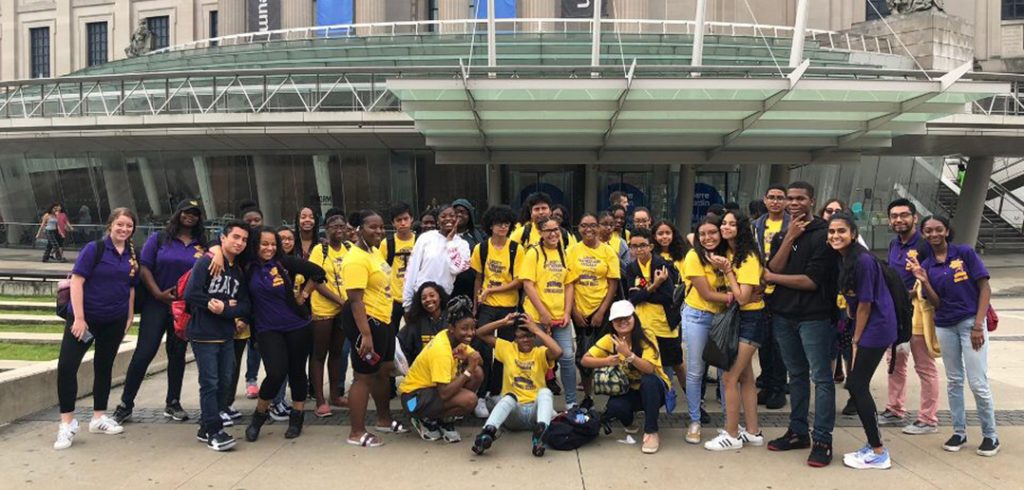More than 350 at-risk teens from two Bronx middle schools and four high schools take part annually in the program operated at Fordham through the Graduate School of Social Service (GSS) and managed under the leadership of Program Director Diane Ode, GSS ’11. Over 30 Fordham undergraduate and graduate volunteers work alongside the teens both at the Rose Hill campus and in their respective schools. In addition to their volunteers, the program recruits MSW candidates to provide individual and group counseling to the teens during the school day.
“For many of these students it’s their first time on a college campus,” said Ode. “We collaborate with different Fordham departments such as The Center for Community Engaged Learning, Career Services, and various student-led organizations. It’s amazing work when you start to see the students begin to understand the opportunities that they can have.”
Ode said that the program is one of the many areas where education and social services overlap. She said the reason she and other social workers are drawn to the program is that it tackles the challenges facing at-risk youth through “holistic service that promotes student’s academic success, as well as their social and emotional well being.” In promoting academic success volunteers help students with homework, prepare for standardized exams, and fill out college applications. To promote social well-being the teens go on campus tours together, take enrichment trips to Broadway shows, and attend STEM conferences. For emotional well-being, the program also provides a series of interventions that include individual and group counseling.
“This program really shows how the Graduate School of Social Service can bring together all our Fordham communities to affect the change,” said faculty adviser Janna Heyman, Ph.D., professor of social work and the Henry C. Ravazzin Chair.
Ode started as a MSW intern in the program in 2010 and continued on as a summer program coordinator when she graduated in 2011. She steadily rose through the ranks to become an assistant director in 2012 and then program director in 2015. Bronx-born and raised in New Jersey, Ode still has family near campus. As a young 8-year-old girl, Fordham was the first college campus she ever saw during her frequent visits with her family to the Fordham Road shopping district. She said that she feels a strong kinship with the students and their families because of her own upbringing in the Tremont section of the Bronx.
“Resources at many New York City schools are overwhelmed; a guidance counselor can serve up to 100 students,” she said. “That’s where we come in with the extra support.”
The teens in the program face a variety of risk factors that often stem from problems at home, which can cause high absenteeism and deter motivation. She noted that many of the program’s volunteers are not from the Bronx and that their initial exposure to these young people, as well as the public schools themselves, can in itself be a learning experience.
“I think it opens up their eyes and they learn about the social and economic disadvantages that Bronx students are facing every day,” she said. “Many of the volunteers are shocked when they have to go through a metal detector or see that there are six schools in one building. It’s a huge culture shock.”
To prepare them, she said, the program provides an orientation and ongoing volunteer meetings to support volunteers’ work with at-risk youth, and the culture of service at the University advocates listening to the community.
“We do our best to have discussions to help them understand that, ‘Yes, you’re giving back to the community by teaching students how to better improve their grades and be motivated to pursue their education, but this is a mutual transaction and you’ll also get something back,’” she said.
Feeling Like a Part of the Bronx
Katrina Cullen is a junior at Rose Hill majoring in history. She started volunteering with the Liberty program more than a year ago. Though she said she was very involved with other student groups, she said she didn’t feel like she was part of the Bronx, even though the campus sits in the heart of the borough.
“It is completely transformative to have a purpose and have kids depend on you to help you with their school work or to know they have a test coming up and they’re counting on you,” she said.
Cullen, who grew up in Putnam County, New York said she was initially nervous about whether the kids would accept her into their community, but soon realized they had more in common than not. She said once she started building relationships, a few of the Latino students found out she was studying Spanish. From that point forward, they would speak to her in Spanish to help her prepare for her classes.
“When I started there were definitely a lot of cultural differences, but they’re so patient with me,” she said. “They’re just normal kids who are extremely accepting and a great time to be around. It makes you feel really good that you build relationships bigger than yourself.”


